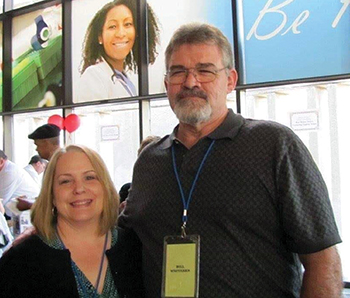Oral Cancer Survivor
Never Give In, Never Give Out, Never Give Up
 “Wildman” was Bill Whitaker’s well-earned nickname during his younger years as a concrete construction worker and bar bouncer. By 51, he fueled his ambition “to win the rat race at any cost” with a two-pack-a-day cigarette habit. Then he was diagnosed with end-stage cancer of the tongue and given no hope. Bill travels a much different road today, and he credits a clinical trial, fellow cancer survivors who became family and faith that turned rock solid.
“Wildman” was Bill Whitaker’s well-earned nickname during his younger years as a concrete construction worker and bar bouncer. By 51, he fueled his ambition “to win the rat race at any cost” with a two-pack-a-day cigarette habit. Then he was diagnosed with end-stage cancer of the tongue and given no hope. Bill travels a much different road today, and he credits a clinical trial, fellow cancer survivors who became family and faith that turned rock solid.
February 19, 2004, was my day of reckoning. I was diagnosed with Stage IV squamous cell cancer at the base of my tongue. The tumor lodged in my throat was too large to remove with surgery, the oncologist said, so beyond keeping me comfortable, there was nothing he could do for me.
I walked out of his office in disbelief, my mind in a fog. For a year, I’d been treated by a doctor elsewhere who’d misdiagnosed my condition as acid reflux. Still shell-shocked, I lied to my wife, Mary, saying it was no big deal. A lifetime ago, I’d first spotted her in high school study hall. We’re a memorable couple — she’s 5 feet, 2 inches, and I’m 6 feet, 4 inches. We were married in 1972, and we’ve weathered an awful lot together. Six years before I was diagnosed, our son was murdered. I just couldn’t tell her I was dying of cancer, not yet. A person can only take so much.
But three days later, we got the phone call that ultimately saved my life. A colleague of my oncologist offered the last spot in a national clinical trial. I said, “I’ll take it,” before he could finish explaining. If I didn’t make it, at least the medical scientists might learn something that could help future cancer patients.
Facing your own mortality forces you to reflect on every misdeed, every person you’ve wronged, every loved one you’ve hurt with words or actions. I’d bulldozed through life focused on myself, caught in the rat race to make money and build a business, getting ahead no matter the cost. This clinical trial was actually something good I could do with my life, and it gave me hope.
The majority of the 60 head and neck cancer patients in the study were also Stage IV. The trial consisted of three chemotherapy drugs given for about two months, followed by radiation therapy with a chemotherapy infusion once each weekday for three weeks, then twice each weekday for another three weeks.
For induction therapy, I was hospitalized to have a port put in my chest and received two chemotherapy drugs overnight. The third drug dripped in for another 96 hours, but by then it felt like I was dying. My kidneys kept shutting down, and I was in and out of the hospital for days.
I quickly became unrecognizable. I lost my thick head of hair and my beard from the chemotherapy, and my face was a road map of red and blue veins. Even with a feeding tube in my stomach, my weight plummeted from 330 to 240 pounds. Our daughter left culinary school to come home and care for me. She mixed up all sorts of liquid concoctions trying to get some nutrition into me without much luck. Water tasted like chlorine.
About two months into the trial, a minister friend called while we were driving to an oncology checkup. He said a prayer over the phone, describing a miracle that would cure me and amaze my doctors. At the clinic, the oncologist scoped my throat to check the tumor, but he looked for a lot longer than usual. He was just bewildered because the tumor was completely gone! Believe it or not, much of what my oncologist said that day was identical to the words in that prayer.
With no tumor left, I balked at following through with the radiation therapy. But a former neighbor whose son grew up with ours was a nurse at the cancer center, and I let her talk me into it. Long story short, a few years later we founded a head and neck cancer support group to assist others. Those folks became my family.
I’ve been cancer-free ever since, although not without serious health problems. I couldn’t work for two years, and over time we racked up huge medical bills for treatment-related ailments. Just the highlights: chemo-induced cataracts, acoustic neuroma that destroyed hearing in one ear, knee replacements, a shoulder replacement, permanent neck cramps and three strokes. I also deal with balance issues and some short-term memory loss.
Of course, it’s been worth it. My faith has soared through the roof, we have 15 grandkids and great-grandkids we adore, and I help direct a sales force for a concrete equipment sales company. I’ve written a book, “Back Against the Wall: My Walk With Cancer,” and I also answer questions posted to online cancer support groups.
I advise anyone newly diagnosed to do the research, reach out to others and always advocate for yourself. My motto is, “Never give in, never give out, never give up — and never go it alone.”


